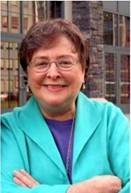Introducing Elizabeth Johnson

Elizabeth Johnson, the author of Ask the Beasts, has been a Distinguished Professor of Theology at Fordham University since 1991. A member of the Sisters of St. Joseph of Brentwood, she has also served as head of the Catholic Theological Society of America and the American Theological Society.
Johnson’s best-known works:
• She Who Is: The Mystery of God in Feminist Theological Discourse (1991) was the first extended attempt to integrate feminist categories such as experience and emancipation into classical Catholic theology.
• Quest for the Living God: Mapping Frontiers in the Theology of God (2007) presented a concise and bold overview of the new theologies within Christianity.
• Ask the Beasts: Darwin and the God of Love was published in 2014.
Introducing ourselves:
Our opening discussion showed that we come from diverse religious backgrounds:
Participants (in the discussion and on-line) are Roman Catholic, varieties of Protestant,
Mormon, Unitarian, Buddhist, Jewish…
But we share a common perspective:
+ A willingness to explore beyond our early religious boundaries…
+ A willingness to use our minds in our faith and spiritual practice…
+ An openness to other spiritual traditions.
In our work lives, we have pursued many occupations and vocations: We are
Scientists; nurses (in many fields, including psychiatric nursing);
Clergy (of several denominations, including a hospice chaplain); spiritual directors;
Artists; musicians; writers and poets;
Teachers (of all levels through post-graduate education – and a musician/teacher)
We have similar interests and loves:
We want to use – and stretch – our minds
+ We need to better understand the theory of evolution and its implications
We want to keep – and stretch – our faith
+ We need an image of God/the Holy which fits the world as we are coming to know it
We want to care for the natural world
+ Loving the world around us, we want to preserve it
And now: introduce yourself
What do you hope to learn from Ask the Beasts?
What are your hopes for these discussions?
What are your questions?
To add your comments to this post,
just click on ‘Leave a Reply’ or ‘Replies’ (below).
After giving your name and email address,
there will be space for your thoughts and questions.

I hope to learn from Ask the Beasts more about the specifics of what Darwin wrote. As Johnson introduces her work, she notes that our understanding of his work may not be what he wrote. I have never read the full On the Origin and the excerpts I read were years ago.
From these discussions, I hope to learn how others understand Darwin and why evolution has become such a hot button issue. It’s science, an exploration of observations from the natural world and attempts to generalize from those observations and make sense of the world. How did this become so controversial?
My questions: how does Christian theology relate to Darwin and the scientific method? What areas conflict with 19th century theology? How has theology changed in response? What are other areas of discussion?
Christine, these are great questions that get to the heart of ASK THE BEASTS.
In the first part of the book, we’ll be examining Darwin’s life and travels — and the observations that led him to develop his theory of evolution. It took some time for Darwin’s observations to be accepted as fact, but even then his theory was controversial because of its implications for (1) human beings and (2) for their traditional understanding of God. We’ll also see why Christian theology (in the 19th century, but still for many Christians today)- was not equipped to deal with the theory and its implications.
In the second part of the book, Johnson will lead us through some theological ‘stretching’ — and she will make us stretch — all with the goal of helping us to deal with the implications of the theory.
Darwinian evolution is not really controversial outside of the United States. In this country it is controversial for cultural reasons: the persistence of Fundamentalism and the literal interpretation of Genesis. Lately another source of controversy has been the attempt to revive the “argument from design” by proposing that some features of organisms are so complex that they could only have arisen through an “intelligent designer”. Those who believe in this argument have controversially attempted to introduce it into high school biology in some States, so far without success.